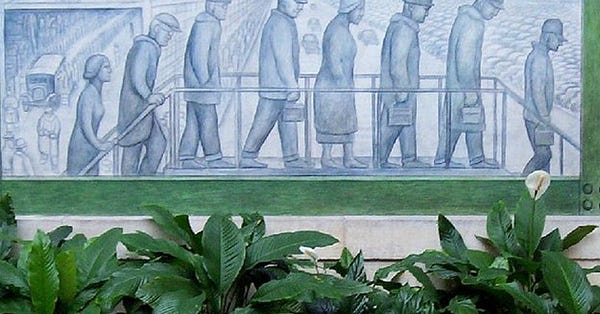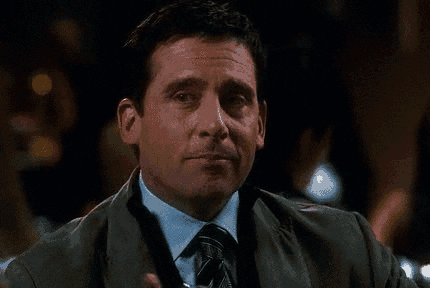Praxis Makes Perfect: Sarah Jaffe
A reporter and author on labour issues, Sarah Jaffe makes understanding the politics of your bullshit job accessible for Vox, Buzzfeed - and now Chompsky!
It’s another installment in this new interview series: Praxis Makes Perfect!
Are you one of those SJW bores that want to make the world better? But, let me guess — half a century of neoliberalism and your worsening Twitter addiction has drained you of any sense of agency and battered your brain like a Mars bar, and you just don’t know how!
Begin by getting to know the people already doing the work, and following their lead. This will help you find your lane.
Each interview will focus on praxis: action that allows you to put into practice whatever the interviewee’s work centers around - today’s is: Organising.
This week I talked to Sarah Jaffe, an American reporter and author who writes about labo(u)r issues. She is currently, alongside numerous other excellent freelance journalists, a Type Media Fellow meaning that her work is so good, that a nonprofit pays her specifically to do that and only that. And if you read enough Chompsky or know anything about the current state of jobs in journalism, you’ll know how special that is.
I’m particularly interested in her work because she tells human stories about work and organising, from history and today, with humour, illuminating in an accessible way the hidden mechanisms of exactly how the workplace works.


1. Introduce yourself however you wish!
I'm Sarah Jaffe, I'm a reporter and the author of two books: Work Won't Love You Back and Necessary Trouble.
2. Give a brief overview of your career trajectory up to now.
I worked in restaurants and retail from the time I was 14 til I was 27, when I went to journalism school. I'd been trying (and failing) to get into journalism as a freelancer since I was in university, but finally realized that the shape of the industry means that "breaking in" is incredibly difficult without the connections that j-school and, unfortunately, internships give. I was an intern at The Nation magazine when I finished j-school just as global capitalism was collapsing in 2009, and I was lucky enough to get a job working for Laura Flanders on what was then known as GRITtv (now The Laura Flanders Show). I had a couple of other full-time journalism jobs after that, at AlterNet and In These Times, but I've essentially been a freelancer since 2012. My first book was published in August of 2016, and the second one January of this year!
3. I'm fascinated by your work because not only do you speak about labour issues, but also freelancing in journalism, two areas of interest for me. What's a typical day in finding stories for labour reporting?
These days I am tripping over them! My inbox is overflowing with press releases, and I also keep up with unions and organizers on social media (ugh, mostly Twitter). I also get editors writing to me asking if I'd like to cover a certain thing. So for instance in the last few weeks I've had a story on a nurses' strike in Massachusetts, which I co-wrote with a friend, that I sought out--reached out to the union--because it was a historic strike (and is still ongoing at ten weeks), I did a long feature story on worker centers in the US on an editor's request, a report for the Rosa Luxemburg Stiftung on tech workers at their request, and I wrote a rather ranty piece for the Baffler that an editor asked me to do but that was based loosely on my book and my observances in general of the Media Discourse About Teachers.
4. Do you consider yourself to be an activist? If so, are there any 'end goals' for your activism?
I don't like the word activist for a few reasons. One, it's been consistently used to belittle my journalism--I and others like me get described as "activists" rather than reporters, as if our stories are biased or wrong because we believe the world is screwed up the way it is. A lot of what I cover is social movements, and so if I am described as an "activist" rather than someone who reports on and studies movements, it's usually to imply that I'm not good at my job and that movements are not things to be covered and studied seriously. Two is that I don't think it's a great thing to think of certain people as "activists" and others as something else, even though usually in any political campaign there are people who are more dedicated and people who spend less time at it but still care. Three, I think "organizing" is a better term to use for most of what needs to happen to change the world.
I do describe myself as a Marxist, a socialist, and occasionally I take part in organizing.
5. Do you do any form(s) of activism other than writing?
Again, don't love the term "activism". Anyway, I've taken part in plenty of campaigns over the years, turned up to a lot of protests, but the thing that I do most often that could be considered "activism" in journalism these days is as a member of the Freelance Solidarity Project of the National Writers Union (in the US) and supporting the organizing that journalists are doing in their workplaces. For example, I was on a panel last week supporting the workers at The New Yorker and Pitchfork, both publications which are looking at a potential strike very soon, and am working on some behind-the-scenes stuff attempting to get agreements with publications around freelancer conditions.
6. For readers who might not understand the need for a union, can you give a brief overview of your thoughts on why they might join one?
I don't think that people should "just join a union" as a sort of moralistic commitment to being a better person. Rather, a union is when you and your coworkers/colleagues across an industry/broadly across the working class come together to have more power in the workplace. Just signing up to pay dues isn't enough. The point of the union is that we are stronger together, collectively, and that it is a way to allow us to claim more of the value that we create in the workplace.
7. There have been waves of layoffs in journalism not only in the last few decades, but particularly in the last few years. Do you have any predictions for the future of journalism?
Journalism will die unless we stop it from dying. No pressure. Billionaires won't save us.
8. Were there any specific moments that radicalised you?
I had a lot of shitty--sometimes literally, my first job was cleaning crew at an outdoor concert venue--jobs.
9. Your most recent book, Work Won't Love You Back, has got some excellent press. Are there any other pieces you've written that you're particularly proud of that you'd like to highlight?
I linked to a few recent ones above!
10. Do you have strong feelings about being labelled ‘on the left’? In the UK, especially after the recent election results, people are saying Labour is dead. What changes can 'The Left' make?
I could (and did) write two books about that question! As I said above, I'm a Marxist, in the sense that I think that the working class needs to take power in society and run it in our collective best interests, but also in the sense of "ruthless criticism of all that exists," which I think is a great tagline for journalists to hang onto! Marx was, among many other things, a journalist himself.
Labour is a party, sure, but labour, little L, as in the workers, is a different thing. What is the Labour Party that we should care to save it? There are real answers to that question: a political party that still hold some of the levers of power in a mostly two-party system; a somewhat democratic institution that is affiliated to trade unions. I've just read Owen Hatherley's wonderful book Red Metropolis, which has me thinking a lot about the levers of local power, particularly after the local election results last week. I've also just come from reporting on a Congressional special election in Ohio here in the states, and was thinking a lot about the things Nina Turner, the candidate I'm profiling, said about how Democrats/progressives/the left in office need to change *people's material conditions.* If people don't perceive their life as getting better under a party's rule, they're not going to stick around for the long term.
Anyway. I'm a journalist, I still currently reside in the US so I'm still very much looking at the Labour party as an outsider, but these are the questions that I'm thinking about currently. Also that political parties are very much only one way to make change--community organizing (which the new Labour leadership decided to eliminate), tenant organizing, social movement work like the Kill the Bill protests that are ongoing, and of course, unions are all other ways to do political work.
11. You've said that your work is inspired by punk rock. Got any song recommendations? (I like Kyoto Now by Bad Religion.)
I grew up outside of Boston, Massachusetts, which has a very strong tradition of sort of blue-collar punk rock where bands literally sing about "your family, your friends, your union, your wife." I probably got into unions in part because I listened to the Dropkick Murphys as a teen. I'm also just a little too young for Riot Grrl but seeing Bikini Kill live a couple years ago (In Brixton!) was incredible. I also make playlists as a form of procrastination, so if anyone wants to follow me on Spotify (not to confuse me with the actual musician named Sarah Jaffe, I have zero talents in this field) you'll find a ton of recommendations and also see how often I binge-listen to Stevie Nicks or Carly Rae Jepsen.
12. Which organisations/other journalists do you think are doing the most important activism work currently?
I want to shout out the journalists' unions: the NewsGuild and the Writers Guild of America, East in particular over here in the US. I do some work with the folks at the MIC Center (Media, Inequality, Change) at Rutgers and the University of Pennsylvania. And of course I was a guest at the Media Democracy Festival put on by the UK Media Reform Coalition! Also I've been really impressed by some recent labor reporting by the Bureau of Investigative Reporting.
13. If you could boil it down to three political changes that need to happen in the US, what would they be?
The workers should seize the means of production.
....
Full communism.
I joke, but like, I can't boil anything down simply otherwise. I'd love to see the Senate pass voting rights reform, the PRO Act, and Biden's care work plan, which requires likely eliminating the filibuster, and I've already lost most of your readers...
Thanks to Sarah for taking the time to answer my questions - is there an opportunity to organise at your workplace? Or join an organising group that already exists? Find out!
Stay tuned for more Chompsky interviews with people doing important work in media/politics/workers rights.
And please share with others you think might be interested!






This was fascinating, I'm sending it to my boyf, signed up Labour man and general working-class hero.